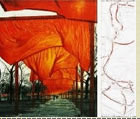Story of Evolution/Evolution of Stories
Bryn Mawr College
February 14, 2005
Art for All...Science for All?
Paul's invitation to us, two weeks ago,
was into a different understanding of science than many of us grew up with:
as something everyone does from birth ("whaaa!") and
as stronger and more productive if everyone continues to engage in it,
if the numbers of observations and stories that contribute to science
come from as wide a range of people as possible....
I had an experience this weekend that symbolized for me that vision:
"The Gates, Central Park, New York, 1979-2005":
"No one can own the work...and no one must pay to see it....
everyone who visits "The Gates" will own the experience...
[then] it will be recycled...."
(The Economist 2/12-18/05)
Christo Posters for "The Gates"
So...let's enter our own gates, take a walk...
Haley :
I really liked the analogy of Darwin's idea as the universal acid that eats through traditional thought and everything that is sacred to us. But I also liked the fact that he said that if we fear the idea in that way, we might never learn "some surprising or even shocking things about these treasures."
Nada : universal acid "eats through almost every traditional concept and leaves in its wake a revolutionized world view".... Its almost like he thinks for you in this book and provokes further deeper thought. Where one would have stopped ordinarily is simply presented as the starting point in this book .
From Universal Acid to Universal Battery??

Image from the ZBattery.com
A report of what we've been thinking about over the weekend...
There seemed to be three (main) starting points:--
purpose, God, and morality:
Paul: both Mayr and Dennett seem so pushy, ie purpose-full? Aren't Mayr and Dennett both products of evolution? And, if so, how can they have purpose if the process doesn't?
Becky: it is very hard to write about anything without having a distinct purpose.... There seems to be a tendancy to seek "truth" whether or not one really believes that it exists.
Lauren T : Can a work of literature have a purpose beyond what the writer intended? Or maybe the writer's purpose is something that even the writer can't fully understand until the work has been written.
Does evolution have a purpose? Does a creator lie behind it?
Britt: new book out claims that humans have a predisposition (via evolution) to believe in a god.
Ariel : I love the the op-ed article that Britt posted a link for....we all have the gene VMAT 2, but depending on which variant you have, you are either more or less likely to believe in a god.
Kelsey : It seems incredible that [belief in God] could be genetically related... it seems more probable that ...the more education you have, the less likely you are to be religious.
Tonda : I'll agree with Kelsey's idea that it seems as if there is an inverse relationship between education and 'religion' ....I personally find that idea very troubling....I do want to pose the idea that the two ideas - evolution and religion (intelligence and faith) - can co-exist.
Eleanor: I am similar to Tonda in that religion is an important part of my life, and I believe that evolution and faith can co-exist. In this way, Dennett's book addresses issues that I had tried to put from my mind while reading Mayr's.
Arshiya: I felt that this book... seemed to very forcefully jeopardize belief in God.
Lauren Z :
perhaps the evolutionary process in itself, however mindless or mechanical, could have intelligence behind it.
Austin: Evolution is a mathematical process that tries different answers until the correct one is found. I love it! ...When I first started thinking about evolution as an algorithm, I was worried that the explanation for this would lead to a creator.... But Dennett answered that ... the algorithm can include some trial and error.
Iva :
everything strives toward disorder... isn't that the purpose of evolution...
If evolution is driven by randomness and disorder, where does morality come from???
Rebekah: research project being conducted at Harvard on the notion of a universal moral faculty
Liz :
I was thinking about whether or not morality is an evolved trait. ...Perhaps we rely more on some inborn sense of morality.
...Perhaps Mayr is afraid that there is no real purpose and that his the reason for his being so pushy....Would it remove our ability to live more happily if we were to feel that purpose was a human construct?
So...back to the saltmines, Paul (to dig up the universal acid--or is it the universal battery?--of skepticism
and with it purpose? meaning? morality? altruism? God? happiness?)




